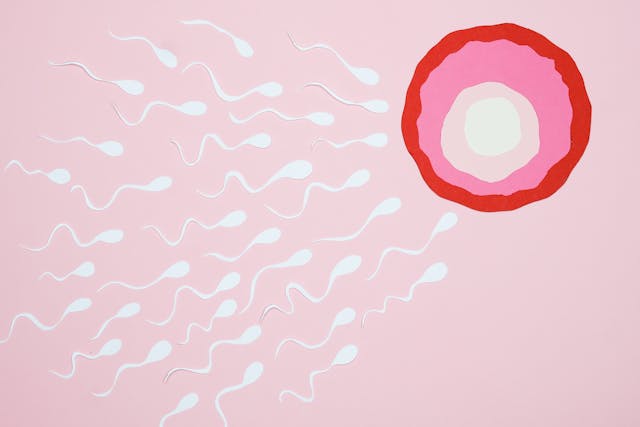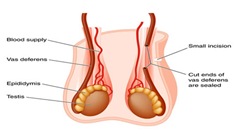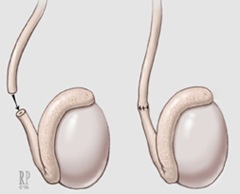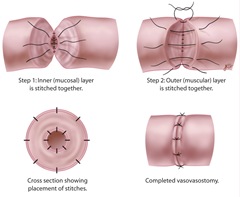When considering options to restore fertility after a vasectomy, two primary methods often come to mind: vasectomy reversal and IVF (in vitro fertilization). Both approaches offer the possibility of achieving pregnancy, but they come with their own set of advantages, disadvantages, and success rates. In this blog, we will compare vasectomy reversal and IVF to help you make an informed decision about the best path for you and your partner.

Vasectomy Reversal: Reconnecting the Pathway
Vasectomy reversal is a surgical procedure aimed at reconnecting the vas deferens, the tubes that were cut during a vasectomy. This allows sperm to be present in the ejaculate once again, enabling the possibility of natural conception.
Pros of Vasectomy Reversal
- Natural Conception: One of the most significant advantages of vasectomy reversal is the potential for natural conception. Couples can conceive through regular sexual intercourse without the need for assisted reproductive technologies.
- Cost-Effective: In the long term, vasectomy reversal can be more cost-effective compared to multiple IVF cycles, especially if natural conception occurs relatively quickly.
- Permanence: Once the vas deferens are successfully reconnected, there is no need for further medical intervention to achieve pregnancy.
Cons of Vasectomy Reversal
- Surgical Risks: As with any surgical procedure, vasectomy reversal carries risks such as infection, bleeding, and complications from anesthesia.
- Recovery Time: The recovery period after vasectomy reversal can take several weeks, during which patients need to avoid strenuous activities and sexual intercourse.
- Variable Success Rates: The success of vasectomy reversal depends on factors such as the time elapsed since the vasectomy, the patient’s age, and the presence of any scar tissue.
Success Rates of Vasectomy Reversal
The success rates of vasectomy reversal can vary. Generally, the procedure has higher success rates when performed within a few years of the original vasectomy. Success rates can range from 40% to over 90%, depending on individual circumstances.
In Vitro Fertilization (IVF): Assisted Reproduction
IVF is a process where eggs are retrieved from the female partner and fertilized with sperm in a laboratory. The resulting embryos are then transferred to the uterus to achieve pregnancy.
Pros of IVF
- Suitable for All Cases: IVF can be a viable option regardless of the time elapsed since the vasectomy. It is particularly useful for couples where the male partner has sperm quality issues or when vasectomy reversal is not feasible.
- Controlled Environment: The fertilization process occurs in a controlled laboratory setting, which can increase the chances of successful embryo development.
- Additional Options: IVF allows for the use of donor sperm or eggs if needed, providing flexibility in achieving pregnancy.
Cons of IVF
- Cost: IVF can be expensive, especially if multiple cycles are required. Costs can include medications, procedures, and laboratory fees.
- Emotional and Physical Stress: The IVF process can be physically and emotionally demanding for both partners, involving hormone treatments, frequent medical visits, and invasive procedures.
- Risk of Multiple Births: IVF has a higher likelihood of resulting in multiple pregnancies, which can increase the risk of complications during pregnancy and delivery.
Success Rates of IVF
The success rates of IVF depend on various factors, including the age of the female partner, the quality of the embryos, and the specific fertility clinic’s expertise. On average, IVF success rates range from 30% to 50% per cycle, with higher success rates often seen in younger women.
Making the Decision: Factors to Consider
Choosing between vasectomy reversal and IVF involves several factors:
- Time Since Vasectomy: Vasectomy reversal is generally more successful when performed sooner after the vasectomy. If many years have passed, IVF might be a more viable option.
- Desire for Natural Conception: If you and your partner prefer to conceive naturally, vasectomy reversal may be the preferred choice.
- Health Considerations: Both partners’ overall health and any specific medical conditions can influence the decision.
- Cost and Insurance: Consider the costs associated with each procedure and whether they are covered by insurance.
Conclusion: Tailoring Fertility Solutions to Your Needs
Both vasectomy reversal and IVF offer viable paths to achieving pregnancy, each with its unique pros, cons, and success rates. Consulting with a specialist can provide personalized guidance, ensuring that your choice aligns with your specific circumstances and fertility goals.
To explore your options for vasectomy reversal or IVF and receive expert guidance, contact Dr. Yaniv Larish. Dr. Larish is dedicated to helping individuals and couples navigate their fertility journey and achieve their family planning goals.
Schedule a consultation today to learn more about the best options for you.
Yaniv Larish, MD
(646) 862-5500



